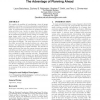Free Online Productivity Tools
i2Speak
i2Symbol
i2OCR
iTex2Img
iWeb2Print
iWeb2Shot
i2Type
iPdf2Split
iPdf2Merge
i2Bopomofo
i2Arabic
i2Style
i2Image
i2PDF
iLatex2Rtf
Sci2ools
118
click to vote
ATAL
2010
Springer
2010
Springer
Distributed coordination of mobile agent teams: the advantage of planning ahead
We consider the problem of coordinating a team of agents engaged in executing a set of inter-dependent, geographically dispersed tasks in an oversubscribed and uncertain environment. In such domains, where there are sequence-dependent setup activities (e.g., travel), we argue that there is inherent leverage to having agents maintain advance schedules. In the distributed problem solving setting we consider, each agent begins with a task itinerary, and, as execution unfolds and dynamics ensue (e.g., tasks fail, new tasks are discovered, etc.), agents must coordinate to extend and revise their plans accordingly. The team objective is to maximize the utility accrued from executed actions over a given time horizon. Our approach to solving this problem is based on distributed management of agent schedules. We describe an agent architecture that uses the synergy between intra-agent scheduling and inter-agent coordination to promote task allocation decisions that minimize travel time and maxi...
Related Content
| Added | 08 Nov 2010 |
| Updated | 08 Nov 2010 |
| Type | Conference |
| Year | 2010 |
| Where | ATAL |
| Authors | Laura Barbulescu, Zachary B. Rubinstein, Stephen F. Smith, Terry L. Zimmerman |
Comments (0)

